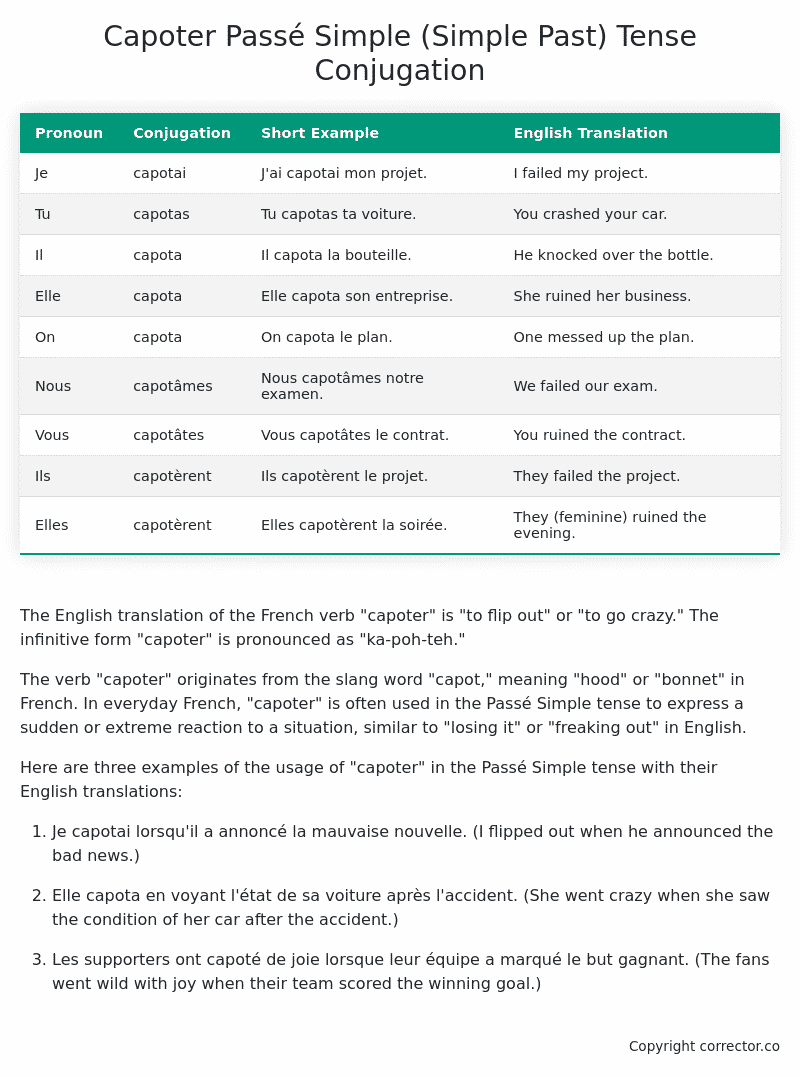Passé Simple (Simple Past) Tense Conjugation of the French Verb capoter
Introduction to the verb capoter
The English translation of the French verb “capoter” is “to flip out” or “to go crazy.” The infinitive form “capoter” is pronounced as “ka-poh-teh.”
The verb “capoter” originates from the slang word “capot,” meaning “hood” or “bonnet” in French. In everyday French, “capoter” is often used in the Passé Simple tense to express a sudden or extreme reaction to a situation, similar to “losing it” or “freaking out” in English.
Here are three examples of the usage of “capoter” in the Passé Simple tense with their English translations:
-
Je capotai lorsqu’il a annoncé la mauvaise nouvelle.
(I flipped out when he announced the bad news.) -
Elle capota en voyant l’état de sa voiture après l’accident.
(She went crazy when she saw the condition of her car after the accident.) -
Les supporters ont capoté de joie lorsque leur équipe a marqué le but gagnant.
(The fans went wild with joy when their team scored the winning goal.)
Table of the Passé Simple (Simple Past) Tense Conjugation of capoter
| Pronoun | Conjugation | Short Example | English Translation |
|---|---|---|---|
| Je | capotai | J’ai capotai mon projet. | I failed my project. |
| Tu | capotas | Tu capotas ta voiture. | You crashed your car. |
| Il | capota | Il capota la bouteille. | He knocked over the bottle. |
| Elle | capota | Elle capota son entreprise. | She ruined her business. |
| On | capota | On capota le plan. | One messed up the plan. |
| Nous | capotâmes | Nous capotâmes notre examen. | We failed our exam. |
| Vous | capotâtes | Vous capotâtes le contrat. | You ruined the contract. |
| Ils | capotèrent | Ils capotèrent le projet. | They failed the project. |
| Elles | capotèrent | Elles capotèrent la soirée. | They (feminine) ruined the evening. |
Other Conjugations for Capoter.
Le Present (Present Tense) Conjugation of the French Verb capoter
Imparfait (Imperfect) Tense Conjugation of the French Verb capoter
Passé Simple (Simple Past) Tense Conjugation of the French Verb capoter (You’re reading it right now!)
Passé Composé (Present Perfect) Tense Conjugation of the French Verb capoter
Futur Simple (Simple Future) Tense Conjugation of the French Verb capoter
Futur Proche (Near Future) Tense Conjugation of the French Verb capoter
Plus-que-parfait (Pluperfect) Tense Conjugation of the French Verb capoter
Passé Antérieur (Past Anterior) Tense Conjugation of the French Verb capoter
Futur Antérieur (Future Anterior) Tense Conjugation of the French Verb capoter
Subjonctif Présent (Subjunctive Present) Tense Conjugation of the French Verb capoter
Subjonctif Passé (Subjunctive Past) Tense Conjugation of the French Verb capoter
Subjonctif Imparfait (Subjunctive Imperfect) Tense Conjugation of the French Verb capoter
Subjonctif Plus-que-parfait (Subjunctive Pluperfect) Tense Conjugation of the French Verb capoter
Conditionnel Présent (Conditional Present) Tense Conjugation of the French Verb capoter
Conditionnel Passé (Conditional Past) Tense Conjugation of the French Verb capoter
Conditionnel Passé II (Conditional Past II) Tense Conjugation of the French Verb capoter
L’impératif Présent (Imperative Present) Tense Conjugation of the French Verb capoter
L’impératif Passé (Imperative Past) Tense Conjugation of the French Verb capoter
L’infinitif Présent (Infinitive Present) Tense Conjugation of the French Verb capoter
L’infinitif Passé (Infinitive Past) Tense Conjugation of the French Verb capoter
Le Participe Présent (Present Participle) Tense Conjugation of the French Verb capoter
Le Participe Passé (Past Participle) Tense Conjugation of the French Verb capoter
Struggling with French verbs or the language in general? Why not use our free French Grammar Checker – no registration required!
Get a FREE Download Study Sheet of this Conjugation 🔥
Simply right click the image below, click “save image” and get your free reference for the capoter Passé Simple tense conjugation!

Capoter – About the French Passé Simple (Simple Past) Tense
Formation
Usage
Narration
Historical Context
Interactions with other tenses
Passé Composé
Imparfait
Conditional and Subjunctive
Summary
I hope you enjoyed this article on the verb capoter. Still in a learning mood? Check out another TOTALLY random French verb conjugation!


